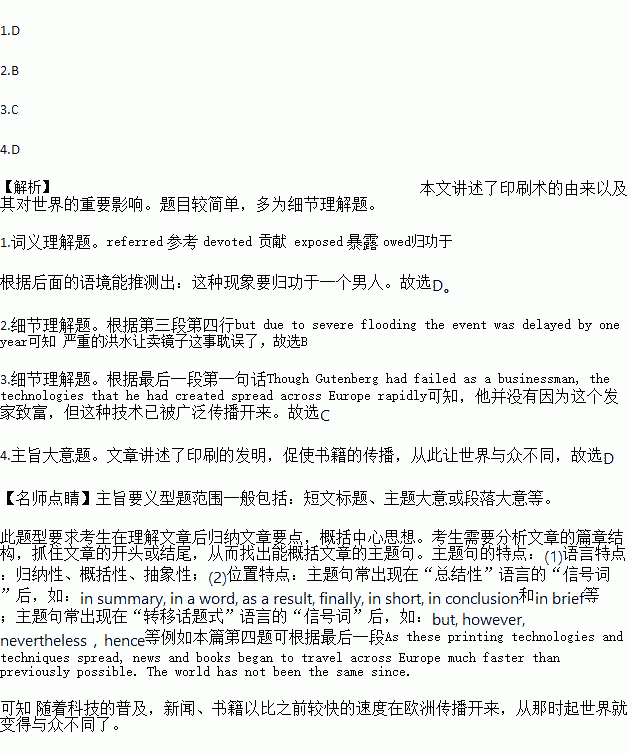题目内容
If you are reading this right now, you are taking part in the wonder of literacy. Because of printed words, people can relay information across both time and space. Much of the credit for this phenomenon can be attributed to one man.
Born in Mainz, Johannes Gutenberg, studied at the University of Erfurt in 1418 and spent much of his young adult life practicing the profession of goldsmithing. In 1439 Gutenberg borrowed money from investors but found himself in financial trouble.
In 1439 the city in which Gutenberg lived was planning to exhibit a large collection of some relics, which was expected to bring many visitors to the town. Gutenberg created many metal mirrors which were to be sold to the visitors. The mirrors probably would have sold well, but due to severe flooding the event was delayed by one year. The investors demanded that Gutenberg return their investments, but he had already spent the money on the mirrors. In order to satisfy the investors, Gutenberg decided to share his secret with them. This secret would forever change the world, all of history, and even the, process of keeping history. He had created the mechanical printing press with movable type.
Gutenberg’s brilliant idea would soon change the world, but he was in financial trouble once again and was accused of mismanaging money. The courts ruled against Gutenberg and Gutenberg lost .the shop he had created.
Before the spread of Gutenberg, s idea, literature was primarily handwritten and thus books were extremely rare and valuable. There was little reason for common people to learn to read or write. Gutenberg’s invention would change all of that. His printing press allowed literature to be produced on a mass scale. His movable metal type could be arranged once to form a page, and his press could print the page again and again.
Though Gutenberg had failed as a businessman, the technologies that he had created spread across Europe rapidly. As these printing technologies and techniques spread, news and books began to travel across Europe much faster than previously possible. The world has not been the same since.
1.Which of the following can replace the underlined word in Paragraph one?
A. referred B. devoted
C. exposed D. owed
2.Why did Gutenberg’s plan to sell mirrors fail?
A. The mirrors were less popular than he had expected.
B. Flooding delayed the event for an entire year.
C. Too many other people had the same idea.
D. Newly invented glass mirrors made his metal mirrors old-fashioned.
3.Which of the following is best supported by evidence from the text?
A. Gutenberg’s idea was a tremendous success that made him incredibly wealthy.
B. Gutenberg’s idea didn’t become popular in his lifetime, but grew very popular after his death.
C. Gutenberg, s idea did not make him rich but spread very quickly.
D. Gutenberg, s idea did not become popular right away but made him incredibly rich over time.
4.Which of the following titles best expresses the main idea of this text?
A. Investing Wisely: Turning Your Good Ideas into Money
B. How to Make Books Using the Gutenberg Method
C. The City of Mainz: Life in Medieval Germany
D. Gutenberg: A Man Who Changed the World


 as a kind of ______ to my community. When I woke up the next day, I didn't see any ______ to speak, so I didn't.
as a kind of ______ to my community. When I woke up the next day, I didn't see any ______ to speak, so I didn't. a ______ view of the environment. People always think it's about planting more trees, but it's more than that; it's about how we treat each other, and that also ______ economic equality and civil rights.
a ______ view of the environment. People always think it's about planting more trees, but it's more than that; it's about how we treat each other, and that also ______ economic equality and civil rights. rk hard.”
rk hard.”